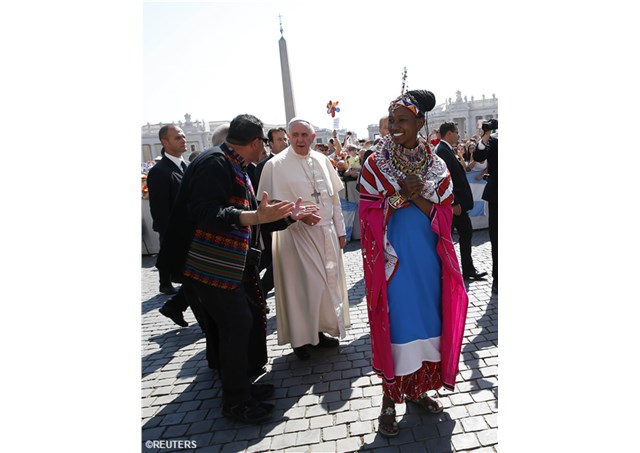
Holy See to UN: No discrimination against indigenous peoples

(Vatican Radio) The Holy See delegation to the United Nations on Monday spoke about safeguarding the human rights and fundamental freedoms of indigenous peoples.
“The Holy See firmly believes that no discrimination based on race, sex, religion or ethnicity should be tolerated,” said Archbishop Bernardito Auza, the Permanent Observer of the Holy See to the United Nations.
Fostering indigenous specificity and cultures does not necessarily mean going back to the past,” he said. “Indeed, it entails the right of indigenous peoples to go forward, guided by their time-honored collective values, such as respect for human life and dignity, representative decision-making processes and preservation of community rituals. In the face of globalization, industrialization and urbanization these values must not be simply put aside.”
The full text of the statement by Archbishop Auza is below
Statement by H.E. Archbishop Bernardito Auza
Permanent Observer of the Holy See to the United Nations
at the 69th Session of the United Nations General Assembly
Third Committee
Agenda Item 65: Rights of indigenous peoples
New York, 20 October 2014
Madam Chair,
The Holy See welcomes the recently concluded World Conference on Indigenous Peoples and takes due note of its outcome document, which will help in the promotion and protection of the rights of the Indigenous Peoples.
Moreover, my delegation is pleased to observe in the Report of the Secretary General the achievements with regard to the goals and objectives of the Second International Decade of the World’s Indigenous Peoples.
However, much still needs to be done to safeguard the human rights and fundamental freedoms of indigenous peoples in many parts of the world, and greater efforts are still to be made - at international, national and local levels - in setting development policies that truly involve the indigenous peoples themselves and respect their specific identity and cultures.
The Holy See firmly believes that no discrimination based on race, sex, religion or ethnicity should be tolerated. Thus, my delegation welcomes the efforts made in several countries to eliminate all discrimination against indigenous peoples and to promote their full and effective participation the decision-making process, especially on issues that directly or indirectly affect them.
Madam Chair,
Fostering indigenous specificity and cultures does not necessarily mean going back to the past; indeed, it entails the right of indigenous peoples to go forward, guided by their time-honored collective values, such as respect for human life and dignity, representative decision-making processes and preservation of community rituals. In the face of globalization, industrialization and urbanization these values must not be simply put aside.
In this context, my delegation wishes to underline the following principles:
- The world's indigenous peoples have the same claim as every person, people or nation to their fundamental human rights to development;
- The realization of their right to development must be as much as possible coherent and harmonious with their specific identity and values;
- The indigenous peoples themselves must have a say on their own development.
In this sense, one should refrain from implementing criteria or setting policies alien or unacceptable to those concerned. Policies formulated for indigenous peoples without their active participation in the decision-making process could do more harm than good, especially if they do not reflect or respect their identity and value system. The temptation to refer to them merely or primarily for folkloric effect must be resisted. Their input in the decision-making process is vital, because the very survival of their identity and heritage could be at stake.
While international efforts towards the development of standards concerning the human rights of indigenous peoples are important, in many respects national and local policies are even more decisive in respecting the specific identity and culture of indigenous peoples and in the protection of their rights. In this context, my delegation wishes to highlight the importance of just laws to regulate the relationship between indigenous peoples and extractive industries operating in ancestral lands: lands that, in many cases, are also of great cultural and environmental significance.
Madam Chair,
As the Secretary General underlined in his Report, the Post-2015 agenda will provide an opportunity to provide initiatives that address the need of indigenous peoples. Additionally, the Holy See suggests that agreed Post-2015 outcome documents must also pay due attention to the situation of indigenous peoples, and that all eventual initiatives concerning them should be inspired and guided by the principle of respect for their identity and cultures, including specific traditions, religious beliefs, and ability to decide their own development in cooperation with their respective national governments and the relevant international bodies.
In conclusion, Madam Chair, my delegation wishes to reiterate the long-standing commitment of the Holy See towards the promotion of the integral development of the world’s more than 370 million indigenous in some 90 countries, in all regions of the world.
Thank you, Madam Chair.
| All the contents on this site are copyrighted ©. |


